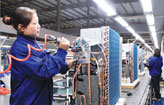Foreign and Military Affairs
World Bank, China to boost co-op on job creation
Updated: 2011-05-27 09:01
(Xinhua)
BRUSSELS - A World Bank official said on Thursday that the institution will deepen its cooperation with China, especially in the area of job creation.
"Cooperation with China over the development of the World Development Report was very strong", said Sarah Cliffe, Director for 2011 World Development Report on Conflict, Fragile States and Development, told Xinhua on the sidelines of the presentation of the report here in Brussels.
Cliffe said that Beijing was very helpful in contributing ideas and perspective into the report through hosting one of the advisory council meetings.
She said the report laid out some key areas where there is potential for China and the World Bank to cooperate more closely, with job creation top on the list.
"Countries around the world really look at China's experience in job creation as being something they want to learn from and it's also an area where China's programs obviously have great potential in cooperation sometimes with other organizations to deliver results for those societies," she said.
"So giving the importance we see on grievance about unemployment and on the tensions which unemployment can bring in countries, we would really see that has been one key area where there would be a great opportunity to closer cooperation," the director said.
In the report published last month, the World Bank said that some 1.5 billion people still live in countries affected by repeated cycles of political and criminal violence.
The report also underlined that citizen security, justice and jobs are key to breaking cycles of political and criminal violence.
In surveys of areas affected by violence, interviewees cite unemployment as the main motivation for recruitment into both gangs and rebel movements, with corruption, injustice and exclusion the main drivers of violence, according to the report.
Commenting on the conflict-affected Middle East and North Africa, she stressed that it is important for people to understand that the history would be determined by the countries' citizens themselves and not by anyone else.
"So just as the revolution was started by those societies internally the transition needs to be determined by them and however much external actors want to help, they can not determine the course of that," Cliffe said.
She said that international actors can provide support for the longer term with institutional transformation that can help maintain momentum in the transitions and keep things on track and avoid a return to insecurity.
"We need first and foremost national ownership and leadership and international players can have a role to play," Cliffe said.
E-paper

Thawing out
After a deep freeze in sales during the recession, China’s air conditioner makers are bouncing back
Preview of the coming issue
Cool Iron lady
Of good and evil
Specials

Memory lanes
Shanghai’s historic ALLEYS not just unique architecture but a way of life

Great expectations
Hong Kong-born singer songwriter rises to the top of the UK pops.

A diplomat of character
Belgian envoy draws on personal fascination to help build China ties.
